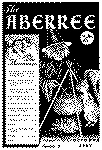Volume 4, Issue 6, page 4
ered the wisest and most learned members
of the society.
These Councilors, especially trained
in the use of their minds, could exchange
thoughts -- and some even learned to control
the minds of others. A few began to use
their mind power for self-aggrandizement
-- and eventually, the Council set itself
up as a ruling group. To pacify the people, they began to promote amusements and
neglected other activities, which led to
schisms in the Council itself. While previously, the nation's basic philosophy
had been an awareness of nature and nature's laws, they began changing to worship of the sun and other planets. Some
groups even began to practice human sacrifice.
Wise leaders, seeing what was happening to their nation, decided to train
picked members to replace the ruling
Council, and when these had been trained,
a national election was held. The new
members won -- but no provision had been
made for ousting the old. As a result,
Atlantis had two councils -- a Junior and
an Elder.
The Junior Council, stymied in its
efforts to govern, appealed to the Phoenix City Council, which voted to give the
Junior Council its support. "Councils of
other cities followed the example," the
report continues, "until it attained such
proportions that even the average person
became aware of it. Eventually, the people began to revolt."
At a public meeting, one Councilor set
himself up as dictator, locked other
Councilors in their chambers, and seized
all means of communication and transportation. The whole continent seethed.
But let ZeNia describe the last moments of Atlantis:
"Among the people were those who had
worked with the radioactive materials in
the underground storage places and knew
where they were stored. These individuals
banded together and were joined by others
in agreement with them. They decided that
the only way to overcome the dictator was
to get control of the radioactive materials.
"When the dictator learned that the
people had secretly seized the storage
places, realizing the peril cf his situation, he frantically ordered the Guards
of Public Welfare to use ray guns against
them. When the guards obeyed, a reaction
of isotopes was started which spread
from one storage place to another. The
whole continent became radioactive; and
finally the lignites and oils contained
in the earth became heated and caught
fire. Great fires burned everywhere,
forming gases which, in turn, exploded,
starting more fires until the whole continent became like a seething volcano.
The atomic explosions were of such massive proportions that they shook the
earth, causing rocks to be rent asunder.
4==Waters poured Into the caverns and tunnels, forming steam which caused more
explosions.
"Because of the greatness of the mountains at either end of Atlantis, the
breakaway, when it took place, was very
sudden and the sinking was rapid, creating huge tidal waves. The waters were
driven back for hundreds of miles, causing great floods everywhere. The sky was
darkened by dust and flying debris; and
when in the course of time quiet settled
over the scene and dawn appeared again in
the slily, little remained of this once
beautiful land. The waters had rolled
over it, leaving no trace."
Except for one main point, and a few
minor ones, we have little fault to find
with "The Rise and Fall of the Atlantean
Civilization". Maybe it is history, as
accurate as the story of George Washington chopping down a cherry tree. But history or not, we found it fascinating
reading.
Oh, yes -- the "point ". After reading
the hook, which told of colonists going
to all points of the globe from Atlantis,
we wondered why they did not have some of
this super-knowledge with them, rather
than forcing civilization to go thru all
the growing pains of ignorance and rediscovery up to the present century -- with
much known thousands of years ago not even
rediscovered to this day.
The minor points we won't even mention
because they aren't important.
"The Rise and Fall of the Atlantean
Civilization" is published by Vantage
Press, New York, at $2.50.
00100
LENDING LIBRARY ALMOST
LIKE MAIL RUMMAGE SALE
Hardly had the September ABERREE been in the
mails than orders began pouring in for books
listed available for lending. BY the third
week, almost every title was in the mails, and
except for the fact there were two or more
copies of some books, many orders could not
have been filled until books had been returned.
It was almost a "mail rummage sale': However ,
it did prove that people are hungry for information, but have not felt they could afford
from $2 to $5 for the many shall printed and
mimeographed editions available -- some of which
had nothing to offer, but this could not be
ascertained until one had "looked" -- at full
price per look. Some of the books, tho small
and cheaply printed, are bargains for those
who want the information they contain, but too
many -- having been disappointed once or twice --
have lumped all such books under suspicion.
Writers who really have something to say
should find the lending library a spur to sales
rather than the opposite. Some write they've
been wanting some book, but held off buying
for fear they might not like it; these welcomed the chance to "sample" the merchandise,
which the lending library permits.


